THE GREAT FEAST
In a state of great sadness Rabbi Isaac one day sat down before Rabbi Judah's door. Coming out and seeing him thus, Rabbi Judah asked: What troubles you this day?
Rabbi Isaac replied: I have come to request three things of you. First, that whenever you recite any one of my elucidations of the Torah, you do so in my name. Second, I ask you to educate my son Joseph in Torah. And third, I ask that you go every seven days to my grave, and pray over it.
Rabbi Judah spoke: What cause have you to think you are going to die?
He answered: Of late my soul has been departing from me in the night, and not illuminating me with dreams as was its wont. And, too, when I incline forward during prayer, I perceive that my shadow fails to show on the wall, and I surmise it is because the herald has gone forth and proclaimed regarding me.
Rabbi Judah then said: I will do as you ask. But in turn I ask you to keep a place for me by your side in the other world, to be together as in this.
Rabbi Isaac wept and answered: I beg you to stay by me for the rest of my days.
Together they went to Rabbi Simeon, who was engaged in study of the Torah. Rabbi Simeon raised his eyes, and saw Rabbi Isaac, and before him, running and dancing, the Angel of Death, and Rabbi Simeon walked to the door, and taking Rabbi Isaac by the hand, he said: I charge that he who is accustomed to enter shall enter, and he who is not shall not enter. Then Rabbi Isaac and Rabbi Judah entered and the Angel of Death was kept outside.
Looking at Rabbi Isaac, Rabbi Simeon perceived that his hour had not yet come, but that he had respite until the eighth hour of the day, and he made Rabbi Isaac sit down and study the Torah. Then said Rabbi Simeon to his son Rabbi Eleazar: Sit by the door, and do not speak to anyone, and if anyone should want to enter, on your oath say he may not.
He turned to Rabbi Isaac: Have you this day seen the face of your father? For we know that when the hour comes for a man to leave this world, he finds himself surrounded by his father and his relatives, and he looks at them and recognises them, and sees all who were his companions in this world, and they escort his soul to the new abode it is to have.
To this Rabbi Isaac answered: I have not as yet seen.
Then Rabbi Simeon rose up and said: Master of the universe! Rabbi Isaac is illustrious among us, and one of the seven eyes of the world. I hold him, and therefore now give him to me.
Then a voice was heard: The throne of his Master is near the wings of Rabbi Simeon. Behold, he is yours and shall escort you when you go in to take abode on your throne.
Now Rabbi Eleazar beheld the Angel of Death approaching, and he said to him: Death cannot cast his doom in the place where Rabbi Simeon is.
Rabbi Simeon then called to his son: Come here and support Rabbi Isaac, for I see that he is afraid.
This Rabbi Eleazar did, and Rabbi Simeon turned away to study. Now Rabbi Isaac fell asleep and in a dream he beheld his father, who said to him: My son, your lot is happy, in this world and in the world to come. For this reason, that among the leaves of the tree of life in the Garden of Eden stands a great tree, which is Rabbi Simeon ben Yohai, mighty in both worlds, and he shelters you with his branches.
Rabbi Isaac asked him: Father, what is my portion there?
He replied: Three days since, your chamber was roofed and made ready for you, with windows on all four sides to allow the light in, and when I saw your abode I was glad, and said: Your portion is a happy one; except that your son has still not learned enough of Torah, And see now, twelve righteous Companions desired greatly to visit you, and just as we were about to leave, a voice issued forth through all worlds, calling, Ye Companions that stand here, take pride in Rabbi Simeon, who has made a request and had it granted.* And more than that, there are here to be found seventy crowned places which are his, and each place has seventy doors which open to seventy worlds, and each world opens to seventy channels and each channel is open to seventy supernal crowns, and thence are ways leading to the Ancient and Inscrutable One,† opening on a view of that celestial delight which gives bliss and illumination to all, as it is stated, "to see the pleasantness of the Lord and to visit His temple" {Ps. 27:4}.
Then asked Rabbi Isaac: Father, how long is it given me to be in this world?
He replied: This I am not allowed to reveal, nor is it shown to a man. However, when the great feast of Rabbi Simeon☨ is held, thou shalt prepare his table.
Rabbi Isaac now awakened, and his face was smiling.
Observing this, Rabbi Simeon spoke: Have you not heard something?
Indeed, he replied: and related his dream, and prostrated himself before Rabbi Simeon.
From that day, it is told, Rabbi Isaac zealously taught the Torah to his son, whom he always kept by his side. When he went to converse with Rabbi Simeon, he used to leave his son outside, and sitting before Rabbi Simeon he applied to himself the words: "O Lord, I am oppressed, be Thou my surety" {Isa. 38:14}.
We have learned that when a man's time arrives to leave the world, on that fearful day the four quarters of the world arraign him, and punishments come up from all four, and the four elements fall into dispute, each clamouring to depart to its own side. Whereupon a herald goes out and proclaims, and the proclamation is heard in two hundred and seventy worlds. If the man merit it, he is joyously welcomed by all the worlds, but if not, woe to the man and his portion!
We have learned that upon the herald's proclamation, a flame issues from the North, going through the "stream of fire" {Dan. 7:10}, and splitting up to pass into the four quarters of the world, there to consume the souls of sinners. After which it leaves and shoots up and down till it settles between the wings of a black cock, which then flaps its wings and crows at the threshold of the gate. First it cries out: "For behold, the day cometh, it burneth as a furnace..." {Mal. 3:19}. The second time it cries: "For, lo, He that formeth the mountains, and createth the wind, and declareth unto man what is thought" {Amos 4:13}; this is the time that a man's deeds bear witness against him and he admits them as his. The third time, they come to deprive him of his soul, and the cock calls: "Who would not fear Thee, O King of the nations? For it befitteth Thee" {Jer. 10:7}.
Rabbi Yose said: Wherefore must it be a black cock?
Replied Rabbi Judah: A mystical meaning inheres in whatever the Almighty does. We know that punishment falls only upon a place which is similar to it. Black being the symbol of the side of judgement, the flame, in going forth, lights on the wings of a black cock, which is the most fitting.
Thus it is when a man's hour of judgement approaches, it starts to call to him; and only the sufferer himself knows, as we have learned, that a new spirit enters from above into a man lying ill, whose hour to depart from the world is near, and it is in virtue of this new spirit that he perceives what he could not before perceive, and then he goes from the world. Thus it is written: "For man shall not see Me and live" {Exod. 33:20}; in lifetime, no, but at the hour of death, it is permitted.
We saw, moreover, that a man, in the hour of his death, is permitted to behold his relatives and companions from the other world. All these rejoice before him, and greet him if he is righteous, but if not, then only the sinners who are daily thrust down into Gehinnom recognize him. All are begloomed and "woe!" commences and ends their converse. Lifting up his eyes, he sees them as a flame darting from the fire, and he with them exclaims "woe!"
We have seen that when a man's soul leaves him, it is met by all his relatives and companions from the other world, who guide it to the realms of delight and the place of torture. If he is righteous, he beholds his place and ascends and is there installed and regaled with the delights of the other world. But if no, then his soul stays in this world until his body is buried in the earth, after which the executioners seize on him and drag him down to Dumah, the prince of Gehinnom, and to his allotted level of Gehinnom.
Rabbi Judah said: During seven days does the soul go from his house to his grave, and from his grave to his house, back and forth in mourning for the body, according to the verse: "But his flesh shall suffer pain for him, and his soul shall mourn over him" {Job 14:22}, and as it beholds the grief of the house, it also grieves.
Now we know that at the end of the seven days the decay of the body sets in, and the soul then goes in to its place. It is first permitted into the cave of Machpelah up to a point, set in accordance with its merit. Then it comes to where the Garden of Eden stands, and there encounters the cherubim and the flashing sword which is found in the lower Garden of Eden, and if it is deemed worthy to do so, it enters.
We know that there four pillars are waiting, and in their hands they hold the form of a body which the soul joyfully dons as its garment, and then it abides in its allotted circle of the lower garden for the stated time. After that a herald issues proclamation and there is brought out a pillar of three hues, called "the habitation of mount Zion" {Isa. 4:5}. By this pillar the soul ascends to the gate of righteousness, where are to be found Zion and Jerusalem. Happy is the lot of the soul deemed worthy to ascend higher, for then it is together with the Body of the King. If it does not merit to ascend higher, then "he that is left in Zion, and he that remaineth in Jerusalem, shall be called holy" {Isa. 4:3}. But when a soul is granted to ascend higher, then it sees before it the glory of the King, and is vouchsafed the supernal delight from the region which is called Heaven. He upon whom this grace is bestowed, fortunate is he.
Rabbi Yose said: There is a higher grace and a lower grace. The higher grace is found above the heavens, as it stands written: "For Thy mercy is great above the heavens" {Ps. 108:5}. And concerning the lower grace it says: "For Thy mercy is great unto the heavens" {Ps. 57:11}, and of this latter are the "faithful mercies of David" {Isa. 55:3}.
________________
*That is, that Rabbi Isaac should live.
† God in his most hidden aspect.
☨ This feast is a parabolic expression for death.
Rabbi Isaac replied: I have come to request three things of you. First, that whenever you recite any one of my elucidations of the Torah, you do so in my name. Second, I ask you to educate my son Joseph in Torah. And third, I ask that you go every seven days to my grave, and pray over it.
Rabbi Judah spoke: What cause have you to think you are going to die?
He answered: Of late my soul has been departing from me in the night, and not illuminating me with dreams as was its wont. And, too, when I incline forward during prayer, I perceive that my shadow fails to show on the wall, and I surmise it is because the herald has gone forth and proclaimed regarding me.
Rabbi Judah then said: I will do as you ask. But in turn I ask you to keep a place for me by your side in the other world, to be together as in this.
Rabbi Isaac wept and answered: I beg you to stay by me for the rest of my days.
Together they went to Rabbi Simeon, who was engaged in study of the Torah. Rabbi Simeon raised his eyes, and saw Rabbi Isaac, and before him, running and dancing, the Angel of Death, and Rabbi Simeon walked to the door, and taking Rabbi Isaac by the hand, he said: I charge that he who is accustomed to enter shall enter, and he who is not shall not enter. Then Rabbi Isaac and Rabbi Judah entered and the Angel of Death was kept outside.
Looking at Rabbi Isaac, Rabbi Simeon perceived that his hour had not yet come, but that he had respite until the eighth hour of the day, and he made Rabbi Isaac sit down and study the Torah. Then said Rabbi Simeon to his son Rabbi Eleazar: Sit by the door, and do not speak to anyone, and if anyone should want to enter, on your oath say he may not.
He turned to Rabbi Isaac: Have you this day seen the face of your father? For we know that when the hour comes for a man to leave this world, he finds himself surrounded by his father and his relatives, and he looks at them and recognises them, and sees all who were his companions in this world, and they escort his soul to the new abode it is to have.
To this Rabbi Isaac answered: I have not as yet seen.
Then Rabbi Simeon rose up and said: Master of the universe! Rabbi Isaac is illustrious among us, and one of the seven eyes of the world. I hold him, and therefore now give him to me.
Then a voice was heard: The throne of his Master is near the wings of Rabbi Simeon. Behold, he is yours and shall escort you when you go in to take abode on your throne.
Now Rabbi Eleazar beheld the Angel of Death approaching, and he said to him: Death cannot cast his doom in the place where Rabbi Simeon is.
Rabbi Simeon then called to his son: Come here and support Rabbi Isaac, for I see that he is afraid.
This Rabbi Eleazar did, and Rabbi Simeon turned away to study. Now Rabbi Isaac fell asleep and in a dream he beheld his father, who said to him: My son, your lot is happy, in this world and in the world to come. For this reason, that among the leaves of the tree of life in the Garden of Eden stands a great tree, which is Rabbi Simeon ben Yohai, mighty in both worlds, and he shelters you with his branches.
Rabbi Isaac asked him: Father, what is my portion there?
He replied: Three days since, your chamber was roofed and made ready for you, with windows on all four sides to allow the light in, and when I saw your abode I was glad, and said: Your portion is a happy one; except that your son has still not learned enough of Torah, And see now, twelve righteous Companions desired greatly to visit you, and just as we were about to leave, a voice issued forth through all worlds, calling, Ye Companions that stand here, take pride in Rabbi Simeon, who has made a request and had it granted.* And more than that, there are here to be found seventy crowned places which are his, and each place has seventy doors which open to seventy worlds, and each world opens to seventy channels and each channel is open to seventy supernal crowns, and thence are ways leading to the Ancient and Inscrutable One,† opening on a view of that celestial delight which gives bliss and illumination to all, as it is stated, "to see the pleasantness of the Lord and to visit His temple" {Ps. 27:4}.
Then asked Rabbi Isaac: Father, how long is it given me to be in this world?
He replied: This I am not allowed to reveal, nor is it shown to a man. However, when the great feast of Rabbi Simeon☨ is held, thou shalt prepare his table.
Rabbi Isaac now awakened, and his face was smiling.
Observing this, Rabbi Simeon spoke: Have you not heard something?
Indeed, he replied: and related his dream, and prostrated himself before Rabbi Simeon.
From that day, it is told, Rabbi Isaac zealously taught the Torah to his son, whom he always kept by his side. When he went to converse with Rabbi Simeon, he used to leave his son outside, and sitting before Rabbi Simeon he applied to himself the words: "O Lord, I am oppressed, be Thou my surety" {Isa. 38:14}.
We have learned that when a man's time arrives to leave the world, on that fearful day the four quarters of the world arraign him, and punishments come up from all four, and the four elements fall into dispute, each clamouring to depart to its own side. Whereupon a herald goes out and proclaims, and the proclamation is heard in two hundred and seventy worlds. If the man merit it, he is joyously welcomed by all the worlds, but if not, woe to the man and his portion!
We have learned that upon the herald's proclamation, a flame issues from the North, going through the "stream of fire" {Dan. 7:10}, and splitting up to pass into the four quarters of the world, there to consume the souls of sinners. After which it leaves and shoots up and down till it settles between the wings of a black cock, which then flaps its wings and crows at the threshold of the gate. First it cries out: "For behold, the day cometh, it burneth as a furnace..." {Mal. 3:19}. The second time it cries: "For, lo, He that formeth the mountains, and createth the wind, and declareth unto man what is thought" {Amos 4:13}; this is the time that a man's deeds bear witness against him and he admits them as his. The third time, they come to deprive him of his soul, and the cock calls: "Who would not fear Thee, O King of the nations? For it befitteth Thee" {Jer. 10:7}.
Rabbi Yose said: Wherefore must it be a black cock?
Replied Rabbi Judah: A mystical meaning inheres in whatever the Almighty does. We know that punishment falls only upon a place which is similar to it. Black being the symbol of the side of judgement, the flame, in going forth, lights on the wings of a black cock, which is the most fitting.
Thus it is when a man's hour of judgement approaches, it starts to call to him; and only the sufferer himself knows, as we have learned, that a new spirit enters from above into a man lying ill, whose hour to depart from the world is near, and it is in virtue of this new spirit that he perceives what he could not before perceive, and then he goes from the world. Thus it is written: "For man shall not see Me and live" {Exod. 33:20}; in lifetime, no, but at the hour of death, it is permitted.
We saw, moreover, that a man, in the hour of his death, is permitted to behold his relatives and companions from the other world. All these rejoice before him, and greet him if he is righteous, but if not, then only the sinners who are daily thrust down into Gehinnom recognize him. All are begloomed and "woe!" commences and ends their converse. Lifting up his eyes, he sees them as a flame darting from the fire, and he with them exclaims "woe!"
We have seen that when a man's soul leaves him, it is met by all his relatives and companions from the other world, who guide it to the realms of delight and the place of torture. If he is righteous, he beholds his place and ascends and is there installed and regaled with the delights of the other world. But if no, then his soul stays in this world until his body is buried in the earth, after which the executioners seize on him and drag him down to Dumah, the prince of Gehinnom, and to his allotted level of Gehinnom.
Rabbi Judah said: During seven days does the soul go from his house to his grave, and from his grave to his house, back and forth in mourning for the body, according to the verse: "But his flesh shall suffer pain for him, and his soul shall mourn over him" {Job 14:22}, and as it beholds the grief of the house, it also grieves.
Now we know that at the end of the seven days the decay of the body sets in, and the soul then goes in to its place. It is first permitted into the cave of Machpelah up to a point, set in accordance with its merit. Then it comes to where the Garden of Eden stands, and there encounters the cherubim and the flashing sword which is found in the lower Garden of Eden, and if it is deemed worthy to do so, it enters.
We know that there four pillars are waiting, and in their hands they hold the form of a body which the soul joyfully dons as its garment, and then it abides in its allotted circle of the lower garden for the stated time. After that a herald issues proclamation and there is brought out a pillar of three hues, called "the habitation of mount Zion" {Isa. 4:5}. By this pillar the soul ascends to the gate of righteousness, where are to be found Zion and Jerusalem. Happy is the lot of the soul deemed worthy to ascend higher, for then it is together with the Body of the King. If it does not merit to ascend higher, then "he that is left in Zion, and he that remaineth in Jerusalem, shall be called holy" {Isa. 4:3}. But when a soul is granted to ascend higher, then it sees before it the glory of the King, and is vouchsafed the supernal delight from the region which is called Heaven. He upon whom this grace is bestowed, fortunate is he.
Rabbi Yose said: There is a higher grace and a lower grace. The higher grace is found above the heavens, as it stands written: "For Thy mercy is great above the heavens" {Ps. 108:5}. And concerning the lower grace it says: "For Thy mercy is great unto the heavens" {Ps. 57:11}, and of this latter are the "faithful mercies of David" {Isa. 55:3}.
________________
*That is, that Rabbi Isaac should live.
† God in his most hidden aspect.
☨ This feast is a parabolic expression for death.
[full original text follows... ☟ ]
Volume 1:217b
א
דִּבְהַהוּא עַלְמָא, תְּבָרִיר דּוּכְתָּאי גַּבָּךְ, כְּמָה דַהֲוֵינָא בְּהַאי עַלְמָא. בָּכָה רִבִּי יִצְחָק וְאָמַר, בְּמָטוּ מִינָךְ, דְּלָא תִּתְפָּרֵשׁ מִנָּאי כָּל אִלֵּין יוֹמִין.
ב
אֲזְלוּ לְגַבֵּיהּ דְּרִבִּי שִׁמְעוֹן, אַשְׁכְּחוּהוּ דְּהֲוָה לָעֵי בְּאוֹרַיְיתָא, זָקִיף עֵינוֹי רִבִּי שִׁמְעוֹן, וְחָמָא לְרִבִּי יִצְחָק, וְחָמָא לְמַלְאַךְ הַמָּוֶת דְּרָהִיט קַמֵּיהּ, וְרָקִיד קַמֵּיהּ. קָם רִבִּי שִׁמְעוֹן, אָחִיד בִּידֵיהּ דְּרִבִּי יִצְחָק. אָמַר, גּוֹזַרְנָא, מַאן דְּרָגִיל לְמֵיעַל, יֵעוּל. וּמַאן דְּלָא רָגִיל לְמֵיעָאל, לָא יֵיעוּל. עָאלוּ רִבִּי יִצְחָק וְרִבִּי יְהוּדָה, קָטִיר מַלְאַךְ הַמָּוֶת לְבַר.
ג
אַשְׁגַּח רִבִּי שִׁמְעוֹן, וְחָמָא דְּעַד כְּעַן לָא מָטָא עִדָּנָא, דְּהָא עַד תְּמַנְיָא שַׁעְתֵּי דְיוֹמָא הֲוָה זִמְנָא. אוֹתְבֵיהּ קַמֵּי רִבִּי שִׁמְעוֹן, וְהֲוָה לָעֵי לֵיהּ בְּאוֹרַיְיתָא. אָמַר רַבִּי שִׁמְעוֹן לְרִבִּי אֶלְעָזָר בְּרִיהּ, תִּיב אֲפִתְחָא וּמַה (צ''ל ומאן) דְּתֶחמֵי, לָא תִשְׁתָּעֵי בַּהֲדֵיהּ. וְאִי יִבְעֵי לְמֵיעָאל הָכָא, אוֹמֵי אוֹמָאָה דְּלָא לֵיעוֹל.
ד
אָמַר רִבִּי שִׁמְעוֹן לְרִבִּי יִצְחָק, חָמִית דִּיוּקְנָא דְּאֲבוּךְ יוֹמָא דָא, אוֹ לָא. דְּהָא תָּנִינָן, בְּשַׁעְתָּא דְבַר נָשׁ אִסְתַּלַּק מֵעַלְמָא, אֲבוֹי וְּקְרֵיבוֹי מִשְׁתַּכְּחִין תַּמָּן עִמֵּיהּ, וְחָמָא לוֹן וְאִשְׁתְּמוֹדַע לוֹן, וְכָל אִינוּן דְּהֲוָה מְדוֹרֵיהּ גַּבַּיְיהוּ בְּהַהוּא עַלְמָא בְּדַרְגָּא חַד, כֻּלְּהוּ מִתְכַּנְּשֵׁי וּמִשְׁתַּכְּחֵי עִמֵּיהּ, וְאָזְלִין עִם נִשְׁמָתֵיהּ, עַד אֲתַר דְּתִשְׁרֵי בְּאַתְרֵיהּ. אָמַר, עַד כְּעָן לָא חָמֵינָא.
ה
אַדְּהָכִי קָם רִבִּי שִׁמְעוֹן וְאָמַר, מָארֵי דְעַלְמָא, אִשְׁתְּמוֹדַע רִבִּי יִצְחָק לְגַבָּן, וּמֵאִנּוּן שִׁבְעָה עַיְינִין דְּהָכָא הוּא. הָא אֲחִידְנָא בֵּיהּ, וְהַב לִי. נָפַק קָלָא וְאָמַר, כּוּרְסְיָיא (ס''א טסיסה) דְמָארֵיהּ קְרִיבָא בְּגַדְפוֹי דְּרִבִּי שִׁמְעוֹן, הָא דִידָךְ הוּא, וְעִמָּךְ תַּיְיתֵיהּ בְּזִימְנָא דְתִיעוֹל לְמִשְׁרֵי בְּכוּרְסְיָךְ. אָמַר רִבִּי שִׁמְעוֹן, וַדַּאי.
ו
אַדְּהָכִי, חָמָא רִבִּי אֶלְעָזָר דְּהֲוָה אִסְתַּלִּיק מַלְאַךְ הַמָּוֶת. וְאָמַר, לֵית קוּפְטְרָא דְּטִיפְסָא, בְּאֲתַר דְּרִבִּי שִׁמְעוֹן בֶּן יוֹחָאי שְׁכִיחַ. אָמַר רִבִּי שִׁמְעוֹן לְרִבִּי אֶלְעָזָר בְּרֵיהּ, עוּל הָכָא, וְאָחִיד בֵּיהּ בְּרִבִּי יִצְחָק, דְּהָא חָמֵינָא בֵּיהּ דְּמִסְתָּפֵי. עָאל רִבִּי אֶלְעָזָר, וְאָחִיד בֵּיהּ. וְרִבִּי שִׁמְעוֹן אַהֲדַר אַנְפֵּיהּ וְלָעֵי בְּאוֹרַיְיתָא.
ז
נַיִים רִבִּי יִצְחָק, וְחָמָא לְאֲבוֹי. אָמַר לֵיהּ, בְּרִי, זַכָּאָה חוּלָקָךְ בְּעַלְמָא דֵין וּבְעַלְמָא דְאָתֵי. דְּהָא בֵּין טַרְפֵּי אִילָנָא דְחַיֵּי דְּגִנְתָא דְעֵדֶן, אִתְיְהִיב (את יתיב) אִילָנָא רַבָּא וְתַקִּיף בִּתְרֵין עָלְמִין, רִבִּי שִׁמְעוֹן בֶּן יוֹחָאי הוּא. דְּהָא הוּא אָחִיד לָךְ בְּעַנְפוֹי, זַכָּאָה חוּלָקָךְ בְּרִי.
ח
אָמַר לֵיהּ אַבָּא, וּמָה אֲנָא הָתָם. אָמַר לֵיהּ, תְּלַת יוֹמִין הֲווּ דְּחָפוּ אִדְרָא דְּמִשְׁכָּבָךְ. וְתַקִּינוּ לָךְ כֵּיוַן פְּתִיחָן, לְאַנְהָרָא לָךְ מֵאַרְבַּע סִטְרִין דְּעַלְמָא. וְאֲנָא חָמֵינָא דּוּכְתֵּיךְ וְחָדֵינָא, דַּאֲמֵינָא זַכָּאָה חוּלָקָךְ בְּרִי. בַּר דְּעַד כְּעָן, בְּרָךְ לָא זָכֵי בְּאוֹרַיְיתָא.
ט
וְהָא הַשְׁתָּא הֲוֵי זְמִינִין לְמֵיתֵי גַּבָּךְ, תְּרֵיסַר צַדִּיקַיָא דְחַבְרַיָיא, וְעַד דַּהֲוֵינָא נָפְקֵי, אִתְעַר קָלָא בְּכֻלְּהוּ עַלְמִין, מַאן חַבְרִין (ס''א שבילין) דְּקָיְימִין הָכָא, אִתְעֲטָרוּ, בְּגִינֵיהּ דְּרִבִּי שִׁמְעוֹן. שְׁאֶלְתָּא שָׁאִיל, וְאִתְיְיהִיב לֵיהּ.
י
וְלָא דָא בִּלְחוֹדוֹי, דְּהָא שִׁבְעִין דּוּכְתֵּי מִתְעַטְּרָן הָכָא דִילֵיהּ. וְכָל דּוּכְתָּא וְדוּכְתָּא, פָּתְחִין פְּתִיחָן לְשִׁבְעִין עָלְמִין. וְכָל עַלְמָא וְעַלְמָא אִתְפַּתַּח לְע' רְהִיטִין. וְכָל רְהִיטָא וּרְהִיטָא, אִתְפַּתַּח לְשִׁבְעִין כִּתְרִין עִלָּאִין. וּמִתַּמָּן אִתְפַּתָּחוּ אָרְחִין לְעַתִּיקָא סְתִימָאָה דְּכֹלָּא, לְמֶחֱמֵי בְּהַהוּא נְעִימוּתָא עִלָּאָה דְּנָהֲרָא, וּמְהַנְיָא לְכֹלָּא. כְּמָה דְאַתְּ אָמֵר, (תהלים כז) לַחֲזוֹת בְּנוֹעַם ה' וּלְבַקֵּר בְּהֵיכָלוֹ. מַהוּ וּלְבַקֵּר בְּהֵיכָלוֹ. הַיְינוּ דִכְתִיב, (במדבר יב) בְּכָל בֵּיתִי נְאֱמָן הוּא.
יא
אָמַר לֵיהּ, אַבָּא, כַּמָּה זִמְנָא יְהִיבוּ לִי בְּהַאי עַלְמָא, אָמַר לֵיהּ, לֵית לִי רְשׁוּתָא וְלָא מוֹדָעֵי לֵיהּ לְבַר נָשׁ. אֲבָל בְּהִלּוּלָא רַבָּא דְּרִבִּי שִׁמְעוֹן, תְּהֵא מְתַקֵּן פָּתוֹרֵיהּ. כְּמָא דְאַתְּ אָמֵר, (שיר השירים ג) צְאֶינָה וּרְאֶינָה בְּנוֹת צִיּוֹן בַּמֶּלֶךְ שְׁלֹמֹה בָּעֲטָרָה שֶׁעִטְּרָה לוֹ אִמוֹ בְּיוֹם חֲתֻנָּתוֹ וּבְיוֹם שִׂמְחַת לִבּוֹ.
יב
אַדְּהָכִי אִתְעַר רִבִּי יִצְחָק, וְהֲוָה חָיִיךְ, וְאַנְפּוֹי נְהִירִין. חָמָא רִבִּי שִׁמְעוֹן, וְאִסְתַּכֵּל בְּאַנְפּוֹי. אָמַר לֵיהּ, מִלָּה חַדְתָּא שְׁמַעְתָּא. אָמַר לֵיהּ, וַדַּאי. סָח לֵיהּ, אִשְׁתַּטַּח קַמֵּיהּ דְּרִבִּי שִׁמְעוֹן.
יג
תָּאנָא, מֵהַהוּא יוֹמָא, הֲוָה
Labels: Aramaic, Book of Splendor, Dumah, English translations, Garden of Eden, Gehinnom, Gershom Scholem, grace, Great Feast, Hebrew, Sefirot, soul, Torah, Tree of Life, Zion, Zohar
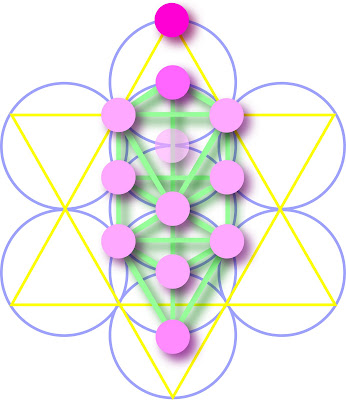

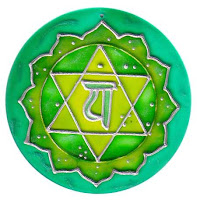

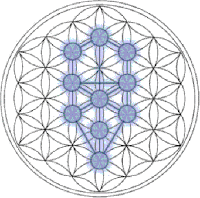

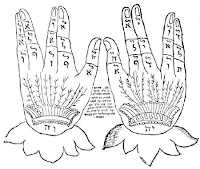

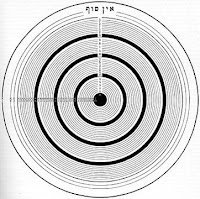
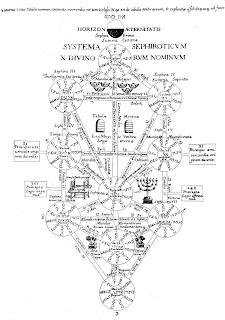
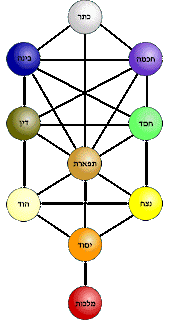
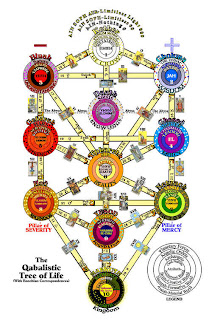

0 Comments:
Post a Comment
Subscribe to Post Comments [Atom]
<< Home